Lexus ES vs VW T-Roc – Differences & prices compared
Compare performance, boot space, consumption and price in one view.
Find out now: which car is the better choice for you – Lexus ES or VW T-Roc?
The Lexus ES (Sedan) comes with a Full Hybrid engine and Automatic transmission. In comparison, the VW T-Roc (SUV) features a Diesel or Petrol engine with Manuel or Automatic transmission.
When it comes to boot capacity, the Lexus ES offers 454 L, while the VW T-Roc provides 445 L – depending on how much space you need. If you’re looking for more power, decide whether the 218 HP of the Lexus ES or the 300 HP of the VW T-Roc suits your needs better.
In terms of consumption, the values are 5.10 L per 100 km for the Lexus ES, and 4.80 L for the VW T-Roc.
Price-wise, the Lexus ES starts at 46600 £, while the VW T-Roc is available from 25800 £. Compare all the details and find out which model fits your lifestyle best!
Lexus ES
The Lexus ES represents a blend of luxury and comfort, offering a smooth driving experience that is characteristic of the brand. With its elegant design and meticulously crafted interior, it provides a serene environment for both driver and passengers. The inclusion of advanced safety features and cutting-edge technology enhances its appeal, ensuring that every journey is not only enjoyable but also secure.
details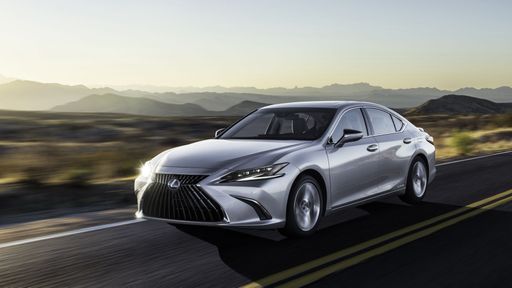 @ toyota-media.de
@ toyota-media.de
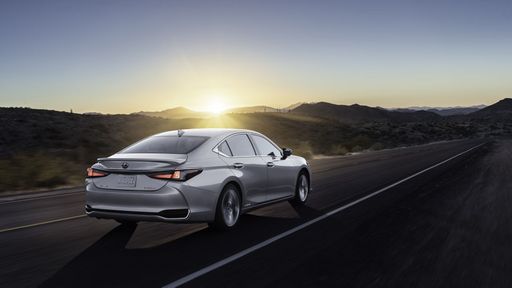 @ toyota-media.de
@ toyota-media.de
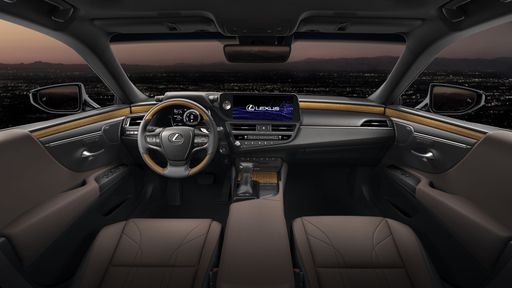 @ toyota-media.de
@ toyota-media.de
VW T-Roc
The VW T-Roc seamlessly blends stylish design with practical functionality, making it an ideal choice for those who enjoy both urban and countryside driving. Its modern interior features intuitive technology and comfortable seating, enhancing the overall driving experience. With its robust build and dynamic performance, the T-Roc is equipped to handle various road conditions with confidence.
details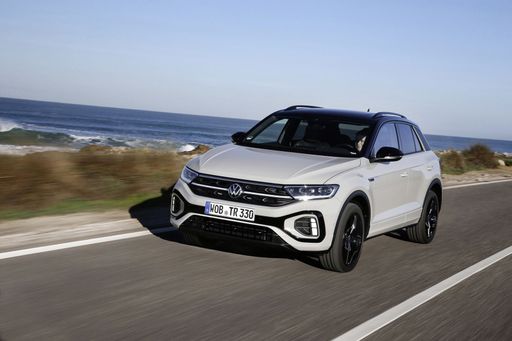 @ Volkswagen
@ Volkswagen
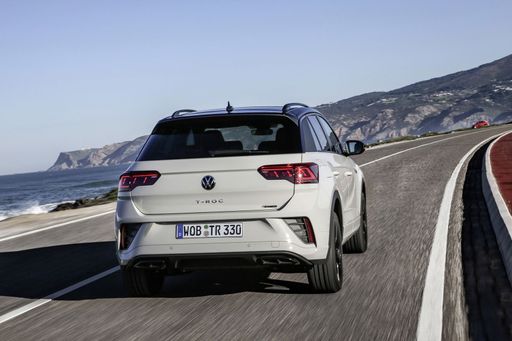 @ Volkswagen
@ Volkswagen
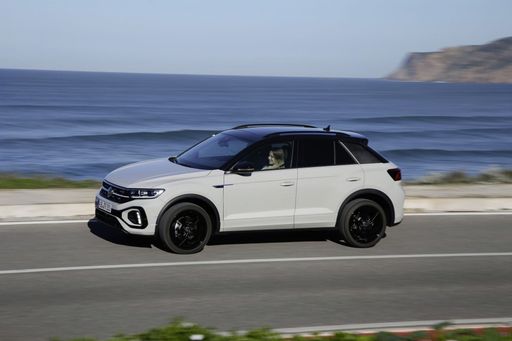 @ Volkswagen
@ Volkswagen
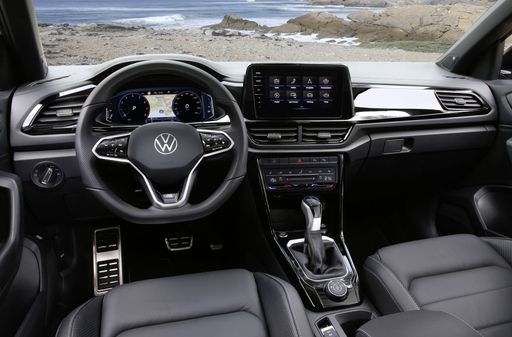 @ Volkswagen
@ Volkswagen

|

|
|
|
|
Costs and Consumption |
|
|---|---|
|
Price
46600 - 59300 £
|
Price
25800 - 45500 £
|
|
Consumption L/100km
5.10 L
|
Consumption L/100km
4.8 - 8.4 L
|
|
Consumption kWh/100km
-
|
Consumption kWh/100km
-
|
|
Electric Range
-
|
Electric Range
-
|
|
Battery Capacity
-
|
Battery Capacity
-
|
|
co2
115 g/km
|
co2
125 - 191 g/km
|
|
Fuel tank capacity
50 L
|
Fuel tank capacity
50 - 55 L
|
Dimensions and Body |
|
|---|---|
|
Body Type
Sedan
|
Body Type
SUV
|
|
Seats
5
|
Seats
4 - 5
|
|
Doors
4
|
Doors
2 - 5
|
|
Curb weight
1680 kg
|
Curb weight
1304 - 1567 kg
|
|
Trunk capacity
454 L
|
Trunk capacity
284 - 445 L
|
|
Length
4975 mm
|
Length
4236 - 4271 mm
|
|
Width
1865 mm
|
Width
1811 - 1819 mm
|
|
Height
1445 mm
|
Height
1527 - 1584 mm
|
|
Payload
470 kg
|
Payload
368 - 516 kg
|
Engine and Performance |
|
|---|---|
|
Engine Type
Full Hybrid
|
Engine Type
Diesel, Petrol
|
|
Transmission
Automatic
|
Transmission
Manuel, Automatic
|
|
Transmission Detail
-
|
Transmission Detail
Manual Gearbox, Dual-Clutch Automatic
|
|
Drive Type
Front-Wheel Drive
|
Drive Type
Front-Wheel Drive, All-Wheel Drive
|
|
Power HP
218 HP
|
Power HP
115 - 300 HP
|
|
Acceleration 0-100km/h
8.90 s
|
Acceleration 0-100km/h
4.9 - 12.3 s
|
|
Max Speed
180 km/h
|
Max Speed
187 - 250 km/h
|
|
Torque
-
|
Torque
200 - 400 Nm
|
|
Number of Cylinders
4
|
Number of Cylinders
3 - 4
|
|
Power kW
160 kW
|
Power kW
85 - 221 kW
|
|
Engine capacity
2487 cm3
|
Engine capacity
999 - 1984 cm3
|
General |
|
|---|---|
|
Model Year
2024
|
Model Year
2024 - 2025
|
|
CO2 Efficiency Class
C
|
CO2 Efficiency Class
D, F, G, E
|
|
Brand
Lexus
|
Brand
VW
|
Lexus ES
Explore the Alluring Elegance of the Lexus ES
The Lexus ES continues to uphold its reputation as a beacon of luxury and innovation in the automotive world. Known for its graceful design and premium feel, the ES series offers an impressive blend of performance and efficiency. With a focus on technical prowess and sustainability, this model is a testament to Lexus's commitment to excellence.
Performance and Efficiency: A Seamless Blend
At the heart of the Lexus ES is its full-hybrid technology. The 218 PS powertrain, featuring a 4-cylinder engine, harmoniously integrates a combustion engine with an electric motor to provide a remarkable drive. The ES achieves its impressive power output of 160 kW while maintaining a commendable fuel consumption of 5.1 L/100 km. This balance between power and efficiency is manifested in its acceleration from 0 to 100 km/h in just 8.9 seconds, powering seamlessly through a cost-effective CVT-gearbox with front-wheel drive. Despite its athletic capabilities, the ES remains well within the bounds of responsible emissions with a CO2 output rated at 115 g/km.
Design and Comfort: A Statement of Luxury
The Lexus ES's exterior is crafted as a testament to sophistication. Its sleek silhouette measures 4975 mm in length, 1865 mm in width, and 1445 mm in height, with a striking aesthetics that demands attention. The interior offers spacious comfort with seating for five, highlighted by high-quality materials and meticulous attention to detail. Additionally, the boot space offers a generous 454 litres capacity, ensuring practicality is not compromised.
Technological Advancements and Features
Equipped with the latest in automotive technology, the Lexus ES features a suite of advanced driver-assistance systems for enhanced safety and convenience. From its responsive infotainment system to the intuitive controls, each feature has been designed with the driver in mind. For those seeking variety, the car is available in several trim levels including the Automatik, Business Edition Automatik, Executive Automatik, and Luxury Automatik, offering a tailored experience for every discerning driver.
Cost of Ownership
With prices ranging from €54,350 to €69,200, the Lexus ES provides a competitive edge in the luxury segment with its multitude of features. The running costs are also reasonable, with expense estimates ranging from €1,289 to €1,497 per month and a cost per kilometre between 51.6 and 59.9 cents. This cost efficiency makes it a feasible choice for those looking to balance luxury with practicality.
Conclusion: A Hybrid of Innovation and Style
The Lexus ES stands as a prime example of how hybrid technology can transform the driving experience, merging the thrill of performance with the benefits of fuel efficiency. With its state-of-the-art features and impeccable build, the ES is a remarkable vehicle for those who seek luxury and innovation on the road.
VW T-Roc
The VW T-Roc: A Blend of Style and Innovation
The Volkswagen T-Roc stands out in the competitive compact SUV segment, offering a dynamic combination of innovative technology and stylish design. The model has evolved since its inception, embracing new features and engineering advancements that appeal to a broad spectrum of drivers.
Engine Performance and Efficiency
The VW T-Roc provides an impressive range of engine options to meet various driving preferences. From the economical 1.0 TSI petrol engines to the robust 2.0 TDI diesels, there’s an engine to match every need. The power output spans from 115 PS to a thrilling 300 PS in the T-Roc R variant. Fuel efficiency is another highlight, with consumption figures ranging between 4.7 and 8.5 L/100 km, making it a practical choice for both city and long-distance driving.
Advanced Technology and Safety Features
Volkswagen has equipped the T-Roc with state-of-the-art technology to enhance both convenience and safety. The latest models include advanced driver assistance systems, such as adaptive cruise control and lane-keeping assist, which provide a safer driving experience. Additionally, the intuitive infotainment system supports a seamless connection to smartphones via Apple CarPlay and Android Auto.
Design and Customisation
The T-Roc’s design is bold and contemporary, reflecting its sporty nature. With a wide array of customisation options, including various trim levels like Life, Style, and the sporty R-Line, there are plenty of opportunities for personal expression. Both the interior and exterior can be tailored, with choices ranging from colour accents to different upholstery options, ensuring each T-Roc feels unique to its owner.
Spacious Interior and Practicality
Despite its compact exterior dimensions, the T-Roc offers a surprisingly spacious interior. It accommodates between four and five passengers comfortably, with ample legroom and headroom. The flexibility extends to the boot space, which ranges from 284 to 445 litres, depending on the configuration, providing practical storage capacity for everyday use or weekend getaways.
Conclusion: A Competitive SUV Choice
Overall, the VW T-Roc continues to be a strong contender in the compact SUV market, combining innovative features, efficient engines, and a distinctive design. It appeals to those looking for versatility and performance in a stylish package, making it an attractive option for both families and individual adventurers alike.
Which drive types are available for the Lexus ES?
Available as Front-Wheel Drive.
The prices and data displayed are estimates based on German list prices and may vary by country. This information is not legally binding.
